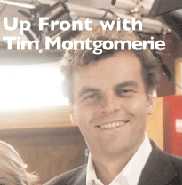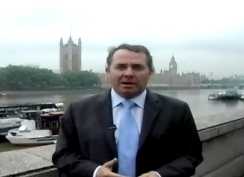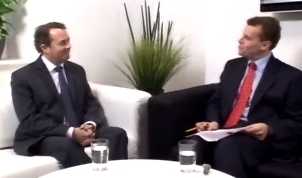 There has been a modicum of excitement on the blogosphere of late, with the arrival of a brash new kid on the block in the form of the UK's first and only internet television station dedicated entirely to politics.
There has been a modicum of excitement on the blogosphere of late, with the arrival of a brash new kid on the block in the form of the UK's first and only internet television station dedicated entirely to politics.Rejoicing in the name 18 Doughty Street, an opportunity to test this new genre came today with the release of an interview from the previous evening. This was between one of the station founders, Tim Montgomerie, and shadow secretary of state for defence Liam Fox in an extended discussion lasting – with a pre-made video insert - a full 42 minutes.
If this service is going to have any value at all, it is precisely its ability to devote considerable more time to unfashionable politicians than is afforded by the main broadcast networks. It can offer a "soft" format, unconstrained by the time limits normally imposed, giving the interviewee every opportunity to put over that which he or she wishes to present. And this is without the filter of the hard-edged media personality who is more concerned with creating an entertainment experience than in gleaning information.
 Obviously, there must be something more to this than simply sitting politicians in the corner of a set, pointing cameras at them and letting them talk. For an interview to make sense and convey interest, it must have a shape. Thus the guiding mind of the interviewer is still massively important.
Obviously, there must be something more to this than simply sitting politicians in the corner of a set, pointing cameras at them and letting them talk. For an interview to make sense and convey interest, it must have a shape. Thus the guiding mind of the interviewer is still massively important.Whether the format succeeds, though, is a little bit difficult to judge on the basis on one interview on one subject, in the early days of the experiment. Looking at it as objectively as one can, the test on this particular occasion – where the shadow secretary of state for defence was being interviewed – was to determine whether the man knew anything about defence, and whether his ideas on that subject were credible.
More to the point, it could be argued, the real measure of a successful interview would be whether a non-expert observer could adduce from the line of questioning that Liam Fox was credible and knew what he was talking about – or not as the case may be.
 Under the guidance of Tim Montgomerie, it has to be said that we heard a great deal about Fox's ideas on fuel security and how there is a convergence between defence and environmental policy - in that reducing our need for oil and increasing energy security is a Good Thing. Liam, we learned, will even send you a leaflet on this, called "over a barrel".
Under the guidance of Tim Montgomerie, it has to be said that we heard a great deal about Fox's ideas on fuel security and how there is a convergence between defence and environmental policy - in that reducing our need for oil and increasing energy security is a Good Thing. Liam, we learned, will even send you a leaflet on this, called "over a barrel".However, when it came to a discussion on defence, one has to say that we are not very much further forward. This may be a reflection of the fact that Liam Fox does not know very much about defence, but it cannot be said that this emerged during his interview. He simply was not asked.
Call me pedantic if you will, but if you are asking a potential defence minister about his plans in a new government, and you actually have troops engaged in a shooting war, then you would tend to ask him a few details about this. You would ask about defence objectives, force numbers required to achieve those objectives, and the force structures, equipment and broad strategy. You would ask this specifically in terms of Afghanistan, in terms of Iraq and then more generally in terms of what a defence minister might want and expect his armed forces to do.
Here in fact was the great disconnect. Armed forces are extraordinarily task-orientated but, to achieve any of their tasks, they need quite specific structures and equipment, and the numbers of men and women on the ground.
As to Iraq, we went into the invasion – the war phase – with an armoured division designed and equipped to fight a Cold War enemy, against a conventional, badly equipped, disorganised and unmotivated enemy. We then took on a counterinsurgency / policing task, against a formidable, highly motivated and increasingly sophisticated enemy, for which our troops were (and are) inadequate in numbers, ill equipped, ill trained and poorly motivated.
 But did we get any detail from Mr Fox as to what force structures, equipment, etc, he would want for troops in Iraq … or in Afghanistan, or to guard our trade or energy routes? Did he have a view on the largest and most expensive procurement programme ever devised for the Army, the £14 billion Future Rapid Effects System? Did we learn whether that was the right move?
But did we get any detail from Mr Fox as to what force structures, equipment, etc, he would want for troops in Iraq … or in Afghanistan, or to guard our trade or energy routes? Did he have a view on the largest and most expensive procurement programme ever devised for the Army, the £14 billion Future Rapid Effects System? Did we learn whether that was the right move?On a broader level, should we have an air-portable Rapid Reaction Force at all, for which FRES is designed, or should we be thinking more in terms of long-term counterinsurgency campaigns and nation rebuilding? Should we be going ahead with the Joint Strike Fighter? Do we need two new aircraft carriers? How many destroyers and frigates do we need? How many more assault ships? Should we continue with the Eurofighter, and what other aircraft does the RAF need?
OK… I think you can guess that none of those details emerged from 18 Doughty Street. Should Tim have sought to elucidate them? Well, it would have been interesting if he had tried – it would have been even more interesting had he succeeded. But he did not try.
Am I expecting too much… being too demanding? I don’t know, but if operations like Doughty Street, with all the access and all the time in the world, don't ask these sort of questions, is there any point of having them?
COMMENT THREAD
